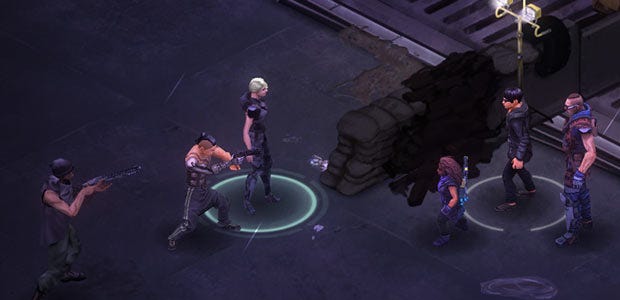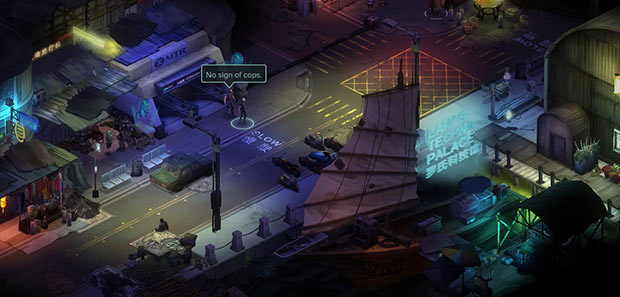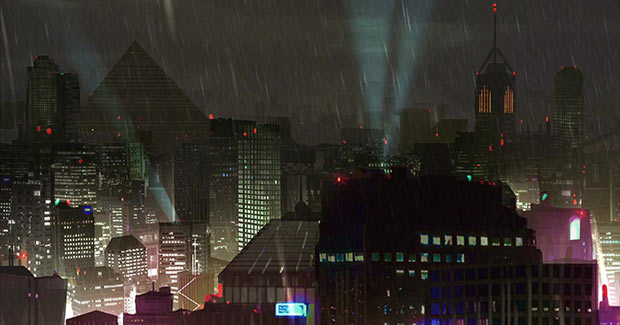Wot I Think - Shadowrun: Hong Kong
Flabby Cyberpunk
Shadowrun: Hong Kong [official site] is the third-and-a-half time around the block for this cyberpunk-but-with-elves roleplaying series, and by now there's a routine and a rhythm. You build a Shadowrunner, a secretive mercenary who can fight with technical or mystical powers (or a combination of the two), leading a team of fixed-spec allies with big personalities through real-time exploration and turn-based action. This time, the setting is one of the touchstones of 80s cyberpunk, and we're dealing with Triads, social segregation and city-wide nightmares in addition to the usual gang war, troll mercenaries and magic-assisted corporate espionage.
The scope is larger - some of the environments are enormous - but broadly speaking it's business as usual, with a few new tricks to dabble with and a ton of new art and writing. Further Adventures In Shadowrun rather than Great Leap Forwards. Granted, this is what was promised in the successful Kickstarter (the series' second), but there is now that nagging sense that this could perhaps be a (very generous) expansion pack rather than whole new game.
The most obvious place the money's been spent is on art: these massive locales and missions with bespoke, hugely ornate decor, most of which is purely backdrop. Take, for instance, the main hub, a sprawling, dockside underworld town which houses your base, quest-givers, a load of different shops, a bunch of oddballs to chat to and a smattering of micro-missions.
In theory, it's great that there's so much to look at, from Majong parlours to docked battleships, magic dens, caravans full of mad drones and illicit augmentation labs, all adorned with dirty neon or sinister leylines. The art is meticulous, luxurious (at least within the confines of this series' slightly cardboard cut-out presentation). In practice, it's a hell of a lot of schlepping around static scenery you saw hours ago, absorbed and then took for granted because all you need from it is to hit the same few spots again and again. It's big for big's sake, and not supported by quite enough to do.
The other big focus is story, deemed to be What The Fans Want, and that too feels Big For Big's Sake at times. The central mystery, of why a foster-father you haven't seen for years has summoned you to a nightmare-plagued Hong Kong, only to immediately go missing and for you to be framed for a crime you didn't commit, certainly has some grab, probably more so than the conspiracies of the two preceding games.
There are also some wonderfully detailed character descriptions and conversations which amp up the ever so slightly tongue-in-cheek hardboiled atmosphere, but by and large every conversation goes on just a little too long. It's perhaps over-dependent on florid description to convey what its static backdrops and fixed-expression characters cannot. There's too much front-loading of exposition too, several hours of prescribed plotting - albeit with plenty of options about how your want your character to treat others - before it releases you to quest and shop and chat to your gang at relative leisure. I suspect devoted Shadowrunheads will lap this stuff up, but some of it really seemed like needless bulk to me, as though Hong Kong was trying to be a more substantially new Shadowrun game than it really is.
The embiggenation is not limited to presentation, fortunately. The game proper has a little more flex than the last one, a couple of more memorable squad members (one, a cannibalistic, Samurai ghoul who'd like to be a more valuable member of society, particularly feels like he walked right out of one of the better Bioware games) and some big, setpiece missions which often offer a choice of violence or avoidance. It'll keep you busy, and you're generally left free to be dick or diplomat. An open world it is not however, which I think is why that massive hub level feels a bit off. It's as though SHK is trying to carry itself like a freeform game, but didn't or couldn't fill it with enough #content. I enjoy the setting and characterisation of this one more than the preceding Dragonfall, but the latter's scale felt like more of a sweet spot. SHK might up the stakes, but getting around is a little fatiguing.
Flabby it might be, but boring it's not, however: this builds on most everything that came before in minor ways, and though its places are still populated by a handful of people rooted to the spot, they're certainly flashier, and it's a pleasure to behold its string of cyberpunky sights.
It worth mentioning that the game takes few prisoners in terms of explaining its many systems, classes and abilities. Token efforts are made to explain how to build a capable character or use advanced skills, but it's pretty clear it presumes that most of its audience has played at least one of the other games. The last thing I'd do is request more tutorial before the game begins in earnest, but an optional, more extensive one would make a lot of sense if you don't know your Conjuring from your Chi. Fortunately it's not a terribly difficult game, being much more about the hours you put in rather than strategic skill, but expect some brow-furrowing if this is your first time. A new system to occasionally choose new powers for squad members, similar to the upgrade tree in XCOM, is at least far better explained, given it involves essentially brand-new, bespoke abilities.
I like Shadowrun: Hong Kong well enough, and it's without doubt the series' glossiest, most generous and flexible instalment yet. I do feel I'm repeating myself to some degree, however. Building up a character, accruing cash to spend on only marginally better weapons and armour, unravelling a conspiracy, occasionally diving into Tronish cyberworld sequences: I've done this twice before, and though I don't resent doing it again I am ready for something more substantially different next time.
On the other hand, I suspect the developers know exactly what fans want and exactly what they're doing, and I'll be surprised if Hong Kong isn't considered the series' new high watermark. While the fantasy elements sometimes felt air-lifted into the earlier games' cyberpunk setting, this meshes the mystical and the science-fictional from the off, using Eastern mythology as a framing construct for its high concepts without tumbling into stereotype too often. Though a section in which you try to improve the feng shui of a slum was a bit much, admittedly.
Shadowrun: Hong Kong is a substantial and in some respects lavish cyberpunk romp, which, if looked at purely in its own right, is only really guilty of a bit of visual and narrative flab. It's got fun characters, loads of skills and spells, eschews melodrama in favour of allowing you to choose how seriously you're going to treat the world you're thrown into, and pretty reliably offers multiple, if slightly perfunctory, quest solutions. If this is your first time with the series, you're in for a merry old time, although I'd still point to the tauter Dragonfall: Director's Cut as a slightly superior Shadowrun experience.
If you've been round the neon block a few times already, then Hong Kong's going to feel pretty familiar, despite being perfectly solid and having a few new toys plus a wider, more ostentatious stage than ever before. This might well be what you want, of course, but speaking as someone who isn't here first and foremost for the love of the setting, I'm not entirely sure all those Kickstarter funbucks have been spent quite as effectively as they could have been.
Shadowrun: Hong Kong is out now.













